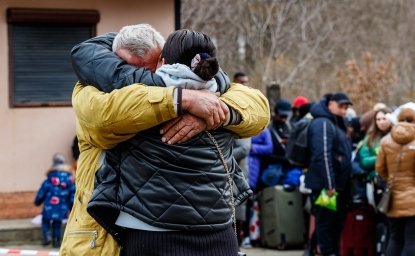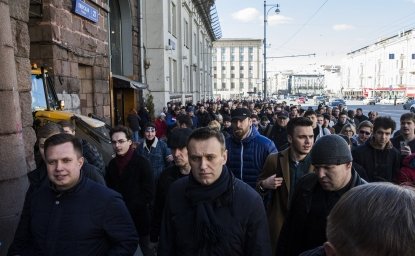
A blog of the Kennan Institute
Theoretically, when warring leaders realize they cannot achieve their goals by force, they begin to consider concessions that once seemed politically impossible. As the historian Geoffrey Blainey once noted, war provides the “stinging ice of reality,” forcing both sides to reassess their performance, resources, and losses, ultimately paving the way for negotiations.
However, this assumes a rational world. In reality, societies often become deeply invested in wars—through the beliefs and values at stake, through the collective sacrifices made. For the politicians who start and wage these wars, the stakes are even higher. Particularly in authoritarian regimes, their personal survival, legacy, and place in history hinge on the outcome. This makes them reluctant to halt hostilities unless confronted by obvious defeat or significant pressure from society or the international community.
In the absence of a decisive result—as is currently the case in Russia’s war against Ukraine—a change in leadership is often what ultimately drives warring parties to the negotiating table. The Korean War stalemate might have dragged on indefinitely had there not been shifts at the top. In January 1953, Dwight D. Eisenhower took office as U.S. president, and in March of the same year, Joseph Stalin died. Just four months later, an armistice was signed in July 1953, marking a critical turning point driven by leadership transitions.
President-elect Donald Trump, though short on specifics, has repeatedly promised to end Russia’s war against Ukraine. “We’re going to work very hard on Russia and Ukraine. It’s gotta stop. Russia and Ukraine’s gotta stop,” Trump reiterated on Thursday during a gala at his Mar-a-Lago estate hosted by the America First Policy Institute.
The end of wars is often shaped by public sentiment and electoral outcomes, as political scientists Ivan Krastev and Mark Leonard have noted. “A lack of public support brought America’s war in Vietnam to an end, the French war in Algeria to its close, and—with Slobodan Milosevic’s defeat at the ballot box in 2000—ended the wars in the former Yugoslavia,” they wrote.
Peace versus Justice
In their analysis, Krastev and Leonard identify two key factions within Western societies regarding the Russo-Ukrainian war: the “peace” camp and the “justice” camp. The “peace” camp prioritizes an immediate end to the conflict, even if it requires Ukraine to make territorial concessions to Russia. In contrast, the “justice” camp insists that lasting peace can only be achieved through Ukraine reclaiming all its lost territories and ensuring a decisive Russian defeat.
The shifting attitudes in Europe offer insight into how Ukraine’s key allies outside the United States might react if faced with a significant reduction in aid from Washington—a scenario that seems plausible, given past statements by Trump and Vice President-elect J. D. Vance on the matter.
European attitudes toward the war in Ukraine have followed a bell-shaped curve. In 2022, a survey commissioned by the European Council on Foreign Relations across ten countries found that 35 percent of respondents aligned with the peace camp, while 22 percent identified with the justice camp. Another 20 percent were undecided but generally supported the EU’s response to Russian aggression. In most countries—except Poland—the peace camp outnumbered the justice camp, reflecting widespread concerns over the economic costs of the war and the risk of nuclear escalation, the survey’s authors noted.
By 2023, following Ukraine’s battlefield successes, the dynamic had shifted. The justice camp gained momentum, with 38 percent of Europeans advocating for Ukraine to reclaim all its territory, even if it meant prolonging the conflict. Meanwhile, support for the peace camp declined to 29 percent. At this point, Ukraine’s Western allies, including the United States, displayed remarkable unity in their backing of Kyiv—2023 became a hallmark year of pro-Ukraine Western solidarity.
However, by early 2024, attitudes had shifted once again. The peace camp regained ground, with 41 percent of Europeans favoring pressure on Ukraine to negotiate a peace deal with Russia, compared to just 31 percent who believed Europe should continue supporting Ukraine in reclaiming all its territories. Notably, in every country polled except Poland and Portugal, more respondents anticipated a Russian victory than a Ukrainian one. The most common expectation, shared by 37 percent of respondents on average, was that the war would ultimately end in a negotiated settlement.
The survey data align with the fact that Europe’s most prominent supporters of Ukraine either are no longer in office (e.g., the UK’s Boris Johnson) or are facing significant domestic political challenges (e.g., Emmanuel Macron of France and Olaf Scholz of Germany). In informal conversations with Bloomberg, anonymous senior sources say there is a growing number among Ukraine's allies who favor a compromise with Russia to be reached at the negotiating table. This suggests that the EU may be leaning more toward a negotiated solution rather than maintaining unwavering support for a complete Russian defeat, regardless of the cost or duration.
Seeking Leverage to Push Putin to the Table
Adding weight to this shift is Scholz’s unexpected conversation with Russian president Vladimir Putin on Friday—the first direct exchange between the two leaders in two years. “The Federal Chancellor urged Russia to be prepared to negotiate with Ukraine with the aim of achieving a just and lasting peace,” a German government spokesperson stated, noting that Scholz had consulted with Ukrainian president Volodymyr Zelensky beforehand and planned to do so again after the call.
A crucial question remains: what kind of pressure could compel Putin to agree to negotiations? As noted, the personal survival and legacy of authoritarian leaders often depend on the outcomes of wars. For Putin, this war—one he is fervently attempting to frame as "Russia’s war" rather than his own—is the pinnacle of his political career.
For any deal to succeed, it would need to be carefully balanced to ensure acceptability for all parties involved. However, the U.S. has far more leverage over Ukraine and Europe than over Russia. Moscow has largely weathered the impact of sanctions, rebuilt its import systems, and continues to generate massive revenues from oil and gas exports. U.S. pressure could potentially lead to political change at the top in Ukraine, but not in Moscow. As shown above, such a change is often a critical prerequisite for achieving peace.
The opinions expressed in this article are those solely of the author and do not reflect the views of the Kennan Institute.
Author

Editor-at-Large, Meduza

Kennan Institute
The Kennan Institute is the premier US center for advanced research on Eurasia and the oldest and largest regional program at the Woodrow Wilson International Center for Scholars. The Kennan Institute is committed to improving American understanding of Russia, Ukraine, Central Asia, the South Caucasus, and the surrounding region through research and exchange. Read more

Explore More in The Russia File
Browse The Russia File
A World Ready for Realignment?

Staging Crime and Punishment, a Ballet of Our Times

The Human Tragedy of War

